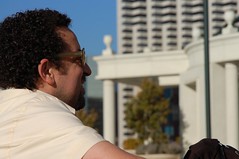I’ve been thinking about tagging a lot recently. One particular thing came to my attention yesterday, and I think it’s worth noting in public.
Users use tags to hack the UI. Tagging isn’t just metadata; it’s metadata you can use.
To wit: a friend mentioned that one of the problems he had with Flickr was that you couldn’t see al the photos from a particular date. Oh, but you can, I said, and showed him the Archives page which does exactly that – it lets you trawl through photographs by date. It’s a really nice piece of design, in fact, so if you’ve never looked at them, go and check them out.
Of course Flickr lets you see things by date – it’s one of the key pieces of data it associates with every picture. Yes, there’s some confusion between “date uploaded” and “date taken on” but that’s dealt with – Flickr lets you view by both.
My friend hadn’t found this supposed lack in functionality a hinrdance, though. Instead, he’s just tagged his photos with a tag for the year (eg ‘2006’) and, sometimes, a tag for the month (‘September’). He’s not the only one – hunt around Flickr for the preponderance of tags like ‘200506’ or ‘20031224’. Lots of people do it.
Why do they do it? Two reasons. Firstly, they’re adding data that they either don’t think is there or that they can’t find. Even though Flickr stores date information, and they can see that at the bottom right of each picture, if they can’t manipulate that data – if they can’t pivot around it – then they store the data in a way they can use it – they stick it in a tag field. And that leads to the second reason: they’re making something to click on.
Making a tag is like making a shortcut button. One click on “2006” shows me all my pictures from 2006. So does the “archives” function but it’s not quite as fast, to be honest, and not as immediately intuitive.
This is true of all tagging systems – tagging makes links, that’s they way it works. So as well as using tags to store data, tags get used to extend and build upon the user interface. As a developer, this has an unexpected bonus. If you see lots of tags emerging storing data you already track (such as dates), consider that the method for accessing data by date might not be obvious (or simple) enough. And if you see enough data of identical format being tracked – often in the form of machine-readable tags, such as geotags, then perhaps it’s time to consider adding a new feature. Tags are a great way to track how uses actually make use of your service.
